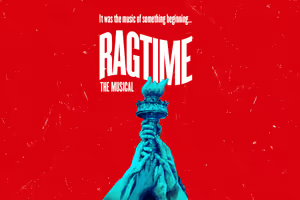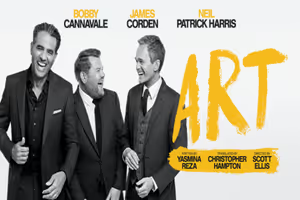As one of the characters in David Mamet's teasing faux-polemic on the subject says, 'Race is the most incendiary topic in our history.' The slender play that takes its terse title from that declaration seems hatched more out of an urge to inflame arguments easily triggered in the age of Obama than out of the need to tell this particular story or even to explore the issue with any real conclusiveness. This being Mamet, however, the dialogue is tasty, the confrontations spiky and the observations more than occasionally biting. Slick but hollow, 'Race' entertains as it unfolds, but grows increasingly wobbly as it twists its way to an unsatisfying wrap-up.
Critics' Reviews
Newcomers to Mamet will probably find Race more interesting than those familiar with his career. All the characteristics that satirists use to spoof the style of the author's more familiar works are there; the clipped, testosterone-driven dialogue, the uncensored language, the self-centered characters with a cold, unsentimental view of the world. Race is a bit like what would happen if the professor from Oleanna was getting legal advice from the Hollywood execs of Speed-the-Plow.
But despite the many provocative attitudes expressed onstage, the play's ideas don't coalesce in meaningful fashion, and the characters, particularly the evasive defendant and the intern with possible motives of her own, never quite come into focus. And with the latter character, Mamet once again reveals the misogynistic attitude toward women that made such works as 'Oleanna' and 'Speed-the-Plow' so problematic.
For the most part, the play is an engaging piece of cultural dialogue. But by the same token, it is considerably undercooked. The characters are broadly sketched and undistinctive, rather like mouthpieces designed just to take opposing positions. Mamet ends the play abruptly by revealing that a confession has been made, putting a quick end to the ambiguity and argumentation upon which the play thrived. And besides some gratuitously graphic language, there's nothing shocking or even original about 'Race.'
David Mamet's new play, Race, is the most interesting new work of his to reach the New York stage in quite some time. It's provocative and savvily written, though it feels in the final analysis more like something designed to push emotional buttons rather than stimulate reasoned thought about the topic that gives it its title. It has been given an expert Broadway production, and features a top-notch cast that boasts two of the most impressive performances currently on view here in town.
The most stunning thing about the David Mamet play that opened last night is how clunky it is. The man's written books about drama and filmmaking, so you'd think his missile against a hot-button issue would at least be well put together. But 'Race,' which Mamet also directed, is a bewildering muddle. Audiences might expect this type of awkwardly constructed, flailing acrimony from a 15-year-old with a Twitter account, not from a Pulitzer Prize winner.
Make Way for Mamet the Didact!
Race is an intriguing play, and far better than Mr. Mamet's last Broadway effort, the mediocre sitcom November. (It's also much better than 'Keep Your Pantheon,' the main piece of The Two Unrelated Plays By David Mamet, which played at the Atlantic earlier this season.) Ultimately, this is not thought-provoking Mamet so much as a parody of it.
Mamet returns to form in 'Race,' then trips up
Are we really meant to be shocked to hear that trials are entertainment or that people of different colors get different treatment? The generalizations - blacks have shame, Jews have guilt - are as inflammatory as a routine by Jackie Mason. The real shock of this Race is that Mamet cannot take them and run.
There are plenty of pointed and thought-provoking exchanges, and the play's structure is sound. Several casually mentioned details later take on great significance. But Mamet, who also directs with a sure hand, fails to get beyond the editorializing to create characters with whom we can identify. Such identification may not be his intention, but it makes 'Race' more a political tract than a compelling drama.
Everyone in 'Race' breathes the same polluted morality that surround just about every other Mamet character. Jack Lawson and his partner Henry Brown are successful defense lawyers. And true to the stereotype they are as cynical and calculating as they come. So cynical in fact, these guys are beyond racism. They're prejudiced against everyone, or so it seems. They're trying to determine whether to take the case of a wealthy white man accused of raping a young black woman. Their newly hired associate also happens to be a young black woman which should be a tip off to anyone familiar with Mamet's writing. The play is as much about sexism as racism. In fact, despite the title, Mamet seems far more eager to steer this play into the murky waters of misogyny. As badly behaved as the men can be, beware the Mamet women.
Billionaire Seeks Truth in Mamet’s Legal Drama
Just as in “Oleanna,” Mamet latches on to a controversial issue, in this case the problem of race as it has affected American politics, jurisprudence, sexual relations and life in general. He has boldly asserted that our 230-year national experience has been a dialogue about race and that the theme of his new play is “race and the lies we tell each other on the subject.”
The problem with 'Race' is that it's a bit too familiar. Specifically, it plays like a cross between Mr. Mamet's 'Oleanna' and his screenplay for 'The Verdict.' I can't say much more than that without giving away the 'surprises' sprinkled throughout the plot, in which two lawyers, one white (James Spader) and one black (David Alan Grier), decide whether to defend a famous millionaire (Richard Thomas) who is accused of raping a young black woman—a decision complicated by the fact that one of their employees (Kerry Washington) is also a young black woman. But those who know Mr. Mamet's work more than casually will likely be able to guess many of the directions in which he takes this conceit, and that's a big part of what's wrong with 'Race.'
In Mametland, a Skirmish in Black and White
Though the play made pointed use of sexual and ethnic words that are still seldom heard in polite discussion, these elicited far more giggles than gasps. I couldn’t help longing for the days when a new play by Mr. Mamet so knocked the breath out of you that you wouldn’t think of standing up afterward until you were sure your legs would support you.
But it might as well have been called Language, which, in Mametland, is all that exists. (When the client worries that a particularly damning quote will be “taken out of context,” Lawson replies dryly, “Well, that is the definition of a quote.”) Characters? Not so much. Lawson (ably embodied by Spader, with only a soupçon of Boston Legal’s Alan Shore) is the only somewhat human entity onstage—Brown is little more than a gadfly/wingman/janitor, and Susan is, well, “fragile,” and therefore treacherous. Sex, race, loyalty, betrayal—it’s all just lecture Legos for Mamet. He makes the ineffable all too effable, and eff you if you can’t take it.
For all the verve of its neo-Shavian back-and-forth, however, Race falters on its way to the finish line. Adept at articulating the play’s issues, Mamet is less successful at dramatizing them. The play is not unlike an 80-minute episode of a televised legal drama (on cable, where they can use the f-word). Its two lawyers are played well by Spader and David Alan Grier, but they have little dimension beyond their arguments; and the other two characters, who have more opportunity for development, register largely as ciphers.
The shock is that the author (who previously staged a two-person dramatic tap dance about men and women, truth and lies in Oleanna) elicits little more than a shrug once all the thrusts and parries, revelations and reversals are toted up. The foursome bark out short, blunt, rhetorically provocative dialogue intended to demonstrate that black people and white people are doomed never to understand one another. But the arguments feel like moves on a game board, not words from the heart.
David Mamet's 'Race' raises difficult questions
Race may be the central theme, but Mamet, who also directed, is more interested in how differences – in color, gender, ethnicity and class – foster a lack of communication and breed resentment. 'It's a complicated world, full of misunderstandings,' Lawson observes. 'That's why we have lawyers.' The line seems at once sarcastic and pedantic. Though Race can be bitingly funny, some of Lawson and Brown's comments threaten to veer into speechifying. Lawson, especially, seems at times to be venting on behalf of the playwright, whose disdain for the strictures of political correctness is well known.
David Mamet's new play, Race (Barrymore Theatre), is all blunt truthfulness—some of which, this being a Mamet play, naturally turns out to conceal lies, or to mask deeper, darker truths. Played fast, under the author's direction, its 80 or so minutes feel like a speedy round of post-Shavian ping-pong. Debating whether or not to defend a rich man (Richard Thomas) accused of rape in what's apparently a clear-cut case with racially inflammatory content, a mixed-race pair of law partners (James Spader and David Alan Grier) and their female assistant (Kerry Washington) rattle around in their spacious office like video-game pieces powered by an unseen joystick, zinging Mamet's poison-dart lines at one another. The end is a Mamet end: Somebody lied, somebody betrayed the side, nobody wins.
'Race' at Ethel Barrymore Theatre, New York
This play probes affirmative action in white-collar professions. It's mostly an attack thereupon. If there is a thesis, it's that the law treated blacks and whites differently a century ago and does the same now. Both imbalances were wrong. You might well take offense at that argument. But if you follow Mamet's logic in 'Race,' you'd argue that no white liberal could write a watchable play on this subject, anyway. He would be too scared.



.jpg?format=auto&width=365)




